
Edition 88 - February 2004

Artwork by: Debbie Rigler Cook
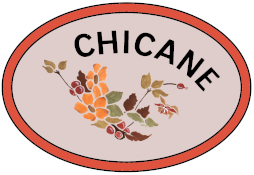
EDITORIAL
I hope everyone had a good Christmas and my best wishes for a happy and, hopefully, peaceful new year.
After such a lovely summer, I think we all hoped for a colder, crisper winter. Not to be! Since Christmas, we seem to have had rain and wind in abundance, and talking of water, we are now well into the works of relining and replacing the mains water system in the village - chaos!
However, we are now becoming accustomed to early magnolia buds and daffodils virtually out in January. Certainly the snowdrops are here again, mornings are getting lighter and the evenings drawing out.
Sincere thanks to our artists and regular contributors for coming up trumps, once again, and to everyone who has sent in something for this issue.
Easter and April will be next, with issue No. 89, and it would be very much appreciated if items and articles could be in at Chicane or the Post Office as soon as possible and by Monday, 15th March, at the latest. Thanks.
Ed.
1
THE DALMATIAN
Dogs are classified in six groups - hound, gundog, terrier, working, toy and utility. The Dalmatian is classified in the utility group, a miscellaneous collection of breeds which don't fit into any of the other five categories. Many choose to call them 'special dogs' as they are some of the more unusual and interesting breeds. Americans refer to them as 'non-sporting' dogs.
Many of these dogs are ancient breeds, created for a purpose in the past which is no longer relevant. For example the poodle was once a water-retriever and herd-guarder; the bulldog, which dates back to the 16th Century, was developed for bull baiting, but the sport was outlawed in 1835.
The Dalmatian, illustrated for us on the cover by Debbie, is intelligent and very affectionate, making a good family pet for the energetic! It is reputed to have been taken by North Indian gypsies to Dalmatia where it was used to give advance warning of invading Turks.
The coat is short, hard and glossy, with black or liver brown spots on a pure white base coat. The pups are normally born white, the spots developing after a couple of weeks.
2

BERRYNARBOR W.l.
At our December meeting, Linda Brown gave an interesting demonstration of some beautiful floral arrangements for Christmas. The vote of thanks was given by Josie Bozier and members then enjoyed tea and mince pies. The raffle was won by Judy Jones and the competition for a seasonal decoration by Di Hillier. On the following Monday, we very much enjoyed our Christmas Lunch at The Lodge, which ended with everyone singing carols and seasonal songs, ably accompanied by Phil on his keyboard. Several members also enjoyed attending the Devon Federation Carol Service in Exeter Cathedral, and the Group Carol Service at Kentisbury Church, hosted by Kentisbury W.l. Just before Christmas, Di Hillier hosted an enjoyable coffee morning at her home, which raised a good sum for our funds.
In January we welcomed two new members, Janet Gibbins and Maureen Wonnacott, and then our speaker, Joan McCallam, brought along a selection of hats from her various holidays and spoke about the countries from which they had come. The vote of thanks was given by Rosemary Gaydon, the raffle won by Doreen Prater and the competition for a holiday photograph by Di Hillier.
Our next meeting will take place on Tuesday, 3rd February, when Alison Berridge will talk about the Children's Hospice South West. The competition will be for a childhood toy. We are also hoping to support the North Devon Hospice's Great North Devon Knit ln.
At the March meeting, on the 2nd, our speaker will be Nina Parnell, Senior Adviser for Care Direct and the competition will be for six hot cross buns or a hand-made Easter card.
We look forward to welcoming any ladies who would like to join us.
Marion Carter
3

IN MEMORIAM
EDWARD [TED] GEORGE LANE
It is with deep regret we report that Ted, having been unwell for some time, died peacefully in his sleep on the morning of 15th January, at the age of 89.
Our thoughts are with Michael and Jo at this time of great sadness.
I should like to thank everybody in the village for their sympathy and condolences on the death of my father 'Ted' [Edward Lane]. He died peacefully in his sleep at Pinehurst on Thursday, 15th January.
I thought it might be of interest to tell you a little about his life. Born at the start of World War l, he was the youngest of five children who lost their father at the Third Battle of Ypres. Times were hard and he was sent to live on a farm in Somerset. By the time he returned to London, his mother couldn't understand a word he said!
During World War II he trained as a Commando in Scotland. He received news from my mother that their twins had been killed and promptly applied for compassionate leave. This was refused. Later it transpired that they were under secret orders to leave for Italy the next day. Dad promptly went A.W.O.L. and was eventually arrested in London. It didn't improve his military career, but at least he lived to have another son, and heir. Many of his friends died in the raid that he should have been on. Life is strange and fickle!
After the war he worked for my mother's farming family, the Potters. The farm is in Hertfordshire, with the Great North Road passing through it. A toll gate barred the way at one end - this is only of interest if you are traveling down the M25 trying to get to a place called Potters Bar!
Just to add a footnote, Dad loved the village and I still can't pass the bus shelter by the church without seeing him sitting there, smoking away and meditating on the world!
Michael and Jo
Our thoughts are also with Kate Kemp and the family following the death of her father, Alec Judson of Combe Martin, on the 5th January at the age of 88.
4
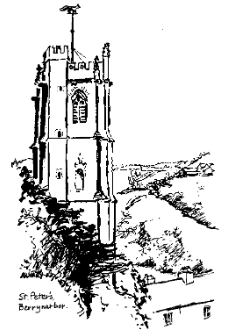
ST. PETER'S CHURCH
How wonderful to see so many people in church over Christmas! At the Carol Service, the choir sang 'O Little Town of Bethlehem' and 'Ding, Dong, Ding', so beautifully. The Sunday School children were all dressed up for their presentation of Christmas in Other Lands, and were thrilled to receive their presents. So much time, care and thought is put in by Sally and her helpers.
On Christmas Eve, the crib was blessed and the magical service was enjoyed by al!, and visitors swelled the congregation on Christmas Day. Our thanks to everyone who helped to decorate the church with the tree and flowers and made such generous donations towards the cost.
Our services now begin at 10.00 a.m. The first and third Sundays in the month take the form of a village/family service and the second and fourth Sundays are Sung Eucharist [Communion] as before. Please see the notice board at the lychgate for details: a set pattern of services should soon be established.
Special Dates:
- 25th February, Ash Wednesday - 2004 sees the 200th anniversary of the Foundation of the Bible Society and, as the Bible Society is our charity for Lent, there will be displays about their work in church and a special service one Sunday to be announced.
- 21st March, Mothering Sunday - a special service with the Sunday School. Our Friendship Lunches at The Globe will continue on Wednesdays 25th February and 31st March.
Mary Tucker
5

SUNDAY SCHOOL
2004, a New Year, a new start and new changes. As we know, Sunday Services in both Combe Martin and Berrynarbor will commence at 10.00 a.m. At Berrynarbor Sunday School we shall be keeping to our usual 11.00 a.m. start, for some of our mums getting children up, washed, dressed and fed is a major task, already gone through on school days. We shall, of course, meet in church on festivals and other special occasions, but I personally shall be sorry to miss our regular Family Service, which, due to other commitments over the past six months, has been poorly attended. I had hoped these problems would now be resolved, but we shall soldier on. A change can be a challenge, a shot in the arm, but we must encourage our children and ensure they come to church as the most important part of their Christian understanding.
True Story
A bishop, resplendent in his purple robes, including his impressive crook, was talking to a group of young children about the Good Shepherd. When he had finished he asked: "Now children, do you know who I am?"
After a moment's silence, one child ventured, "Little Bo Peep?"
With love to you all from Berrynarbor Sunday School for a happy, hopeful and kind 2004.
Sally Barten
6
THE FOURTH WISE MAN
[A Poem by Dermot Dorgan)
Their names, we're told, were Melchior, Caspar and Balthazar.
One brought a gift of frankincense, the others myrrh and gold,
They came to greet the newborn king, the Gospel story told.
They gave their gifts to Jesus in the manger where he lay,
His mother offered coffee but they said they couldn't stay.
They got back on their camels - near the stable they'd been tied
And as they headed off back east, Mary softly sighed:
'I really don't need perfume - though myrrh of course is tops,
And gold is always useful, but we're nowhere near the shops.
And frankincense is lovely, but a stable's not the place .
I hope they're not the wisest men in all the human race.
'It was very good of them to come from such a far off land,
After all that time on camels, it's a wonder they could stand.
But bringing Jesus gifts of myrrh and frankincense and gold.
It's not very practical - he's only ten days old.'
Next afternoon a man appeared outside the stable gate,
He said he was the fourth wise man - and sorry he was late.
"I've brought some things thought I you'd need - it's just a little gift."
A quick inspection of his bag gave Mary's heart a lift.
A frozen casserole was there and a stuffed and fluffy toy,
Some baby clothes in pastel blue - he'd guessed it was a boy!
"The thought of washing nappies", Mary cried, "need not unnerve us
For here's a six-month voucher for a nappy washing service!"
She turned to thank the stranger but the stranger wasn't there.
He'd slipped away and vanished in the chilly winter air.
But on the gate he'd left a note, quite simple but profound
'Don't write this in the Gospel, please - I'd never live it down!'
So don't forget the Fourth Wise Man - the wisest of the lot,
He brought the really useful gifts the other three forgot.

Illustrated by: Debbie Cook
7
TIMING IS OF THE ESSENCE - A CHRISTMAS TALE
It was Christmas at Pink Heather and our grandson, Louis, aged three and a half years, had joined us for the celebrations.
Christmas Eve and the phone rang - it was Chris Walden on the other end, he had spotted a large deer in the field opposite. June, with Louis in tow, and both still in their dressing gowns, rushed down the steps and there in all its glory and in full view, was a magnificent deer. Louis was mesmerised and immediately recognised the beast as Rudolph - who else could it be on Christmas Eve?

Illustrated by: Nigel Mason
The story was, of course, embellished by Louis' parents, Dominic and Julie, until all agreed that Rudolph was doing a 'recce' on Santa's behalf for later on!
I'm sure Louis will never forget this occasion, which you certainly couldn't have planned for - part of the enduring magic of living in this special and beautiful valley.
Bernard
8
THE MENINGITIS
TRUST TODDLE WADDLE 2003
Thirty children, aged six months to four years, from Berrynarbor Pre-School and Toddler Group joined together in October to waddle around the playing field, raising money for the Meningitis Trust.
After the waddle, we returned to the Manor Hall where we had a snack and enjoyed 'duck' related activities.
Meningitis continues to hit the headlines with disturbing regularity, devastating people's lives across the U.K. The money we raised -a total of £464.50 - will be used to continue to fight it, through funding, research and education, and giving support to individuals and families. I should like to thank everyone who took part.
Charlotte Fryer - Berrynarbor Pre-School Leader

9
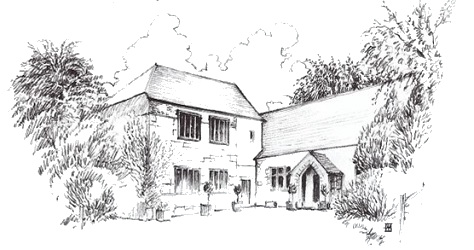
MANOR HALL MANAGEMENT COMMITTEE
The Christmas Card Coffee Morning on 20th December was very well attended and as a result, we made over £150. About a thousand cards were put through the system, so many thanks to everyone who supported the initiative and particular thanks are due to those who helped with the sorting and distribution of the cards. [A reminder will be given next December, but to help them, the sorters have asked that full names and addresses are put on the envelopes.]
It is quite a few years now since Alan Richardson first floated the idea of the village Christmas post. I wonder if he visualised just how successful it would become!
The painting of Watermouth Castle has now been re-hung following repair and restoration work by Nigel Mason. It now looks spectacular. Thank you, Nigel. The picture of Mrs. Penn-Curzon should also be returned soon after her 'wash and brush-up'. Initially the repair and restoration of both pictures was intended to celebrate the new Millennium and it was hoped that a grant, or other funding, might have helped towards the cost, but that was not to be. These two projects have taken longer than hoped to come to completion, but they should enhance the appearance of our hall.
The return of Vi Davies to the Management Committee is very welcome, particularly as she has agreed to look after the bookings and keep the diary up to date. For any future requests to hire the hall, please contact Vi.
So far as the Horticultural and Craft Show is concerned, there have been one or two offers to join a committee and to help on the day, but more help is still required and is there someone willing to co-ordinate and do the organising necessary beforehand? This Show is not something that can be organised at the last minute and it would be a shame if we did not have one this year. Please think about it and then get in touch [883105] or come along to the next Management Meeting to be held on Monday, 2nd February at 7.00 p.m.
John Hood - Chairman
10

BIKERS OF BERRYNARBOR
In December we met for our annual Christmas Dinner and thirteen of us enjoyed an excellent meal and a social evening together. It was an opportune time to welcome Steve Crockett into our group, although he had joined us for our ride to Exeter and a visit to Bridge Motorcycles earlier in the month.
The January meeting was just a 'pint and a chat' affair, but we enjoyed a good natter and our thanks to the Sawmill Inn for their hospitality.
In February, on the 11th, we are planning an evening of racing videos at Cook Island, Mullacott. If the weather conditions are favourable on the 15th, we hope to visit the Classic Bike Show at Shepton Mallet. There will also be a meeting on 10th March, but it may be possible to arrange a Sunday morning ride during the month if the weather [hopefully] improves!
Watch out for the poster in the Post Office for up-to-date information.
Brian
11
THE COASTGUARD HOUSES
I read with interest the article which accompanied the photograph of the Coastguard Station in the last newsletter. I lived there from 1972 to 1981 before moving to Goosewell.
Ilfracombe was our first posting with the Coastguard Service. At the time we had two small daughters, aged 3.5 and 2, and the decision to accept the post had to be made without having visited the station. The sensible thing to do was to telephone the then Station Officer to ask a few questions. This I did and among other things I clearly remember him saying, 'Well, my dear, my wife opened the back door this morning and the wind took it off its hinges and down the garden." He wasn't joking!
We decided to take the post and make the move and a few weeks later visited. It was one of those days which we came to know well - sideways rain and blowing a gale. My first impression was one of horror! The houses appeared to be right on the edge of the cliff and my first thought was what was I going to do with two small girls and another baby due in a few months. However, the decision had been made and we were committed.
The following years were exciting and somewhat challenging. The coastguard station in the summer is quite idyllic, but come late September until April, quite a different story.
Many is the time that I was unable to get out of the house because of the force of the wind which pinned me to the nearest fence. Carpets hovered three inches above the floor in a gale, and washing frequently went to Bristol or the sheets went, leaving the hems firmly pegged to the line! When the girls went to secondary school, they had to crouch behind the stone gate posts in bad weather, and hope that they could leap out before the bus had passed by.
The Coastguards then occupied three of the houses and we were a close community. The nine years I spent there will remain in my memory - the wonderful expanse of sea which I watched while washing up, dramatic changes in the weather and wonderful wild life, even if the pheasants did eat my entire potato crop.
Our children enjoyed a freedom on the headland which they often talk about - camps in the undergrowth and toboggan runs in the snow.
I would not have missed those years, but now enjoy a quieter life in France. However, I do miss the sea. A French wall in front of the sink is not quite the same as the Bristol Channel!
Jenny Taylor
12
HARBINGERS OF SPRING
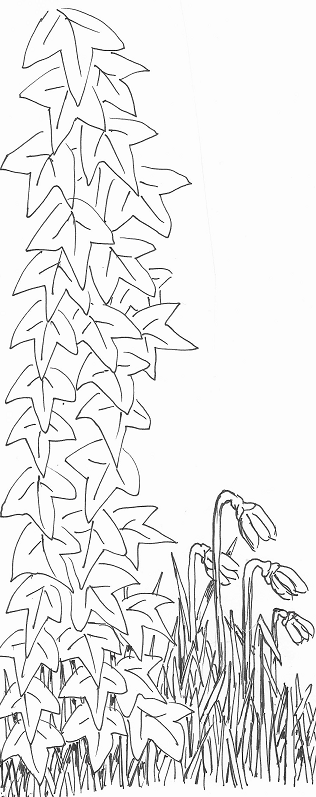
Harbingers of Spring
For Snowdrops are the harbingers of Spring,A sort of link between dumb life and light,
Freshness preserved amid all withering,
Bloom in the midst of grey and frosty blight,
Pale Stars that gladden Nature's dreary night!
Caroline Elizabeth Norton [1808-1877]
Snowdrop
Could you understandOne who was wild as if he found a mine
Of golden guineas, when he noticed first
The soft green streaks in a Snowdrop's inner leaves?
Robert Buchanan [1811-1901]
The Snowdrop
Yes, punctual to the time, thou'rt here again,As still thou art: though frost or rain may vary,
And icicles blockade the rockbirds' aery,
Or sluggish snow lie heavy on the plain,
Yet thou, sweet child of hoary January,
Art here to harbinger the laggard train
Of vernal flowers, a duteous missionary.
Nor cold can blight, nor fog they pureness stain.
Beneath the dripping eaves, or on the slope
Of cottage, garden, whether mark'd or no,
Thy meek head bends in undistinguish'd row.
Blessings upon thee, gentle bud of hope!
And Nature bless the spot where thou dost grow -
Young life emerging from the kindred snow!
Hartley Coleridge
[1796-1849]

13
WELCOME AND FAREWELL
On the 20th January, we shall be moving from Miss Muffet's and should like to say goodbye to all our friends here in Berrynarbor, and thank our loyal customers. We have enjoyed living here, but the time has come for a change and a bit of a rest. We have not made any firm decisions about our next venture, only to say it will be exciting and challenging.
We should love to see any of you if you are ever near by, or fancy a run out. Our new address is: Beers Cleeve Cottage, Brompton Ralph, Taunton, TA4 2RU, telephone [01984] 624882. Bye all.
Love Jeane and Bob
Thank you, Jeane and Bob, for all that you have done for us in the village, we are all very sorry to say goodbye and wish you every happiness in your new home and venture, whatever it might be!
We are also very sorry to lose the Stark Family from Holly Cottage, Hagginton Hill. Julia, Jeremy, Jessica, Juliet and Eloise are taking up residence across the Channel in France. Our best wishes go with you all.
After sad goodbyes, it is good to welcome new folk. Miss Muffet's [Dormer Housel will be home to Eve and David Walker and we hope to be able to welcome them more fully in the April newsletter.
After holidaying with Colin and Wendy at Bessemer Thatch, Janet and David Steed have decided to retire here from Knowle, near Solihull in the Midlands, and moved in to Highgate Lodge on the 13th January. David, an accountant, and Janet, who also worked in the accountancy world, have two children, Sarah and Simon, who have both flown the nest and have families of their own. Sarah lives in America and has a boy and a girl, whilst Simon lives in Solihull with his son and daughter - four grandchildren, two of each!
Janet and David are looking forward to a life at a gentler pace [!]; they enjoy gardening, walking and reading and Janet is a keen floral arranger and, she says, a 'dabbling' artist! However, DIY seems to be on the cards for the next few months.
Our best wishes to all of you in your new homes and we hope you will be happy here in the village.
14

WEATHER OR NOT
2004 has arrived so quickly that we cannot believe it is already time to do another end of year's weather review. Firstly, however, we will have a quick look at November and December.
Although November's rainfall was quite low with only 147mm (5 7/8") recorded, the rain was spread over 25 days leaving only 5 dry days. Wind speeds were a little higher generally with a top gust of 36 knots on the 15th. Temperatures were about normal ranging from an average high of 12.2 Deg C to an average low of 6.2 Deg C and we recorded a wind chill of -20 Deg C on the 24th. December's rain was a little more normal for us with 217mm (8 1/2") compared 182mm (7 1/4") last year. The 12th was a particularly wet day with 59mm (2 3/8") falling during the 24 hour period, this was the wettest day since 12th May 2002 when we recorded exactly the same amount. Those out celebrating New Year's Eve may have noticed that 2003 went out on a slightly damp note 17mm (5/8") fell between about 8 p.m. and midnight! There were a couple of cooler spells early and late in the month, with a minimum temperature of -1.7 Deg C on the 7th and a wind chill factor of -10 Deg C on the 21st. The maximum gust of wind was 29 knots on the 21st. From what we have said about December, you will not be surprised to find that Judie could only find 3.19 hours of sunshine in total, whereas December 2002 made 5.75 hours.
We started to keep detailed figures of the weather in 1994 and 2003 broke the records for rain and heat. Our wettest year was 1994 with 2032mm (80") and up to 2003 our driest year had been 2001 with 1324 (52 1/8"). 2003, however, was dryer still with a total of only 1124mm (44 1/4"). Temperatures were well up and broke longstanding records in some parts of the country. Here we also had some surprises. July topped 34.1 Deg C on the 14th, the previous hottest July day was in 1996 when it reached 28.8 Deg C on the 20th. On the 9th August, the thermometer rose even higher to 34.5 Deg C which easily beat our previous maximum of 32.4 Deg C on 11th August 1995. We also had some low temperatures, -5.9 Deg C on the 17th February was the lowest since 27th December 1995 when it also dropped to -5.9 Deg C. On 31st January we recorded a wind chill of -15 Deg C, the lowest since 1st January 1997 when we had -18 Deg C. No wind speed records were broken, here in the valley the strongest gusts were 36 knots on 7th March and 15th November. The barograph ranged between a high 1037mbs and a low 975mbs.
We would like to wish everyone a happy, healthy and peaceful 2004.
Simon and Sue
15
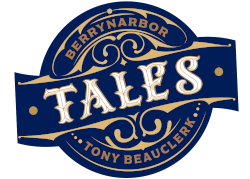
MARINA
A story for the Young and Young at Heart
Little Jenny Berricombe lived on Hagginton Hill with her mother, Mary, and her father, John. Her mother was a good cook, making wedding and Christmas cakes and sometimes cooking at the nearby Castle, when the 'posh' people had their friends and relations to stay. Her father had, many years ago, worked at the Saw Mills and also on various farms.
They were a happy family, but very poor. The people of Berrynarbor liked them as they were all often involved with anything at the Manor Hall, and making Berrynarbor look very pretty for the Best Kept Village competition and things like that.
Jenny often went for walks on her own as she loved all things to do with the countryside or the sea. It was on one of these walks that she found herself sitting on a rock below the cliffs where there had once been an old hotel swimming pool. Most of the old swimming pool had gone, either having been pulled down or broken up by the rough winter seas. The owners had now built a new pool for the visitors. However, there was still a shallow pool left and as Jenny stared at it, there was a sudden splash!
"Hello", a piping little voice cried. "Hello", replied an absolutely amazed and startled Jenny. It was a little mermaid, about the height of a chair seat. She had long, fair hair and a very nice face, like the prettiest doll you've ever seen. In no time at all the two were talking like old friends. Jenny told her new friend, whose name was Marina, how she lived in Berrynarbor and went to the village school, where she had lots of friends. "Oh", said Marina, "Please don't tell your friends we've met, it is to be our secret." Jenny said she would keep their secret, and they kept talking, agreeing to meet again at the same time and place the following week.
That evening, over supper, Jenny told her parents where she had been, not mentioning the mermaid. Her father looked up from his meal and said, "Oh! I know that place. A chap called Ginger from Combe Martin and I built the wall around that swimming pool. It wasn't half a job, because we had to do everything at low tide. It was a good pool in its day, with a slide down into it that had water running down and posts with chains on one side, so you didn't fall off the edge of the wall. There were changing huts there too and they called it 'Marina' after a princess."
Jenny was startled, but hid her surprise. She could hardly wait to see her new-found friend again. What did worry her though was that her father was often not well and although he had tried many cures, he did not seem to get any better.

The next time Jenny visited the pool, there, sure enough, was her little mermaid friend. The time she noticed that Marina was wearing a little ring on her finger. It wasn't gold or silver, but transparent like glass.
"Please tell me about your ring", said Jenny, "I've never seen one like that before." Marina smiled and replied, "Well, it is a very special ring and has a job to do. And when that job is done, it will fade away completely." "How old are you?" enquired Jenny. "l don't know" replied Marina, "I've always been here and never seem to get any older."
Jenny asked Marina if she would tell her more about herself, which she did "Well, being a mermaid, swimming is the thing I just love to do. When I swam to Combe Martin, I found Newberry beach lovely, but they had their Earl of Rone stoning on the main beach, so I quickly left. I love Broadsands, it's so quiet there and sometimes I spend the night in that little shallow cave. Way back at Watermouth, I remember people bringing coal over from Wales, and stranding their boats after the tide had gone down so that lorries could go on the beach and unload. I also remember the sailing barges that would leave llfracombe in very rough weather - it's a wonder they didn't tip over!"
"Oh! Do go on, please", said Jenny. "l bet you've never seen Berrynarbor though." "Well, it might surprise you, but as a matter of fact I have." replied Marina. "I'll tell you how it happened."
"Firstly, it had been very wet and all the rivers and streams had risen higher because of the rain, and the Sterridge was no exception. l, of course, entered the river at Watermouth, passed the elvers you often see there and then, as I got near the caves, I saw a mother duck with her ducklings. I swam on past the lake near Mill Farm, where at one time there were two herons with a nest on the island. And then I swam under Pitt Hill bridge. Do you know that the mill pond to Mill Farm was there at one time? I went on past all the Lee farms until I had to stop where the Sterridge had a wide part, something like a pond. 'What a lovely, peaceful place to stop', I thought. But no, suddenly there were three big splashes in the water and it was those naughty otters! Round and round they chased each other, weaving in and out, ducking and diving, wanting me to join in. But they were too fast for me, and off they went down the river. 'Peace at last', I thought, as I lay back in the water. Then there was a rustle in the bushes beside the water and presently a nose poked through. It was a young deer that had come to have a drink. Through the afternoon, other animals came for drinks - a fox, a badger, a hedgehog and a little vole, who popped into the water. Then the birds came to see me, even a kingfisher, but he was soon gone in a flash of blue. The robin stopped for quite a while. By now it was getting late in the afternoon, so I made my way back downstream and out to Watermouth again. What a lovely day I'd had!"
"What about you?" She asked then. "Where do you go and what do you do when you are not at school?"
Jenny thought for a moment, "Well, I sometimes help with the milk deliveries to people on Hagginton Hill, or go to Miss Cooper's shop in the village, or up the Valley to buy tomatoes. Sometimes I help with the harvest and I like leading the horse when they are getting the hay in. I walk a lot and one time when Auntie Con came to stay, she said we'd go on a very long walk and we did, all the way to Heddon's Mouth! My legs ached for days after that."
Marina smiled, "I've been there too. What a lot of large rocks there are."
Jenny and Marina met quite often down at the swimming pool and one day Marina asked her how her father was. Jenny said he seemed to be feeling a lot better, but then she noticed that the glass ring on Marina's finger was now hardly visible.
"Ah," said Marina, "l can see you are looking at my ring, and it has nearly gone. Soon it will fade to nothing and the magic of it will be over, but your father will be strong and fit again, I promise you. Soon it will be time for us to say goodbye, as I can tell you will grow into a fine young lady and our meetings will just seem like a dream."
The next time they met, it was very sad for it would be the last time. Marina's ring had completely disappeared and she told Jenny there were other things she had to do and they would not be near the old swimming pool. Jenny and Marina both had tears in their eyes as Marina swam slowly out to sea, turning to wave now and then.
Jenny sat by the pool for a while, 'Had this been real or had she been day dreaming?' Who knows?
When Marina and Jenny met at the pool
To each it was just like finding a jewel.
Their friendship grew and lasted a while,
They parted with tears, but then came a smile.
Tony Beauclerk - Colchester
Illustrated by: Debbie Rigler Cook
16
ENGAGEMENT
We are delighted to announce the engagement , on 10th August, of Charlotte, daughter of Brian and Viv Fryer of Lower Rows Farm, and Michael Davison of Merton, Okehampton. we send you both our very best wishes for future happiness.
17
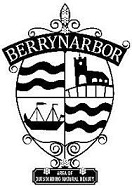
BERRYNARBOR PARISH COUNCIL
Just lately, the media has run many stories about the funding of Local Government, even to the extent of forecasting that a range of new taxes may soon replace the Council Tax, which is much criticised now that it has reached new heights. The advice must be the old adage, "Don't hold your breath". The Government have no firm proposals to put before Parliament, certainly no Bill is ready for debate and a major change in the arrangements for taxation to pay for local government [or indeed anything else] takes a long while to put in place.
So the unloved Council Tax bill will arrive as usual in March!
Most of the money we pay is spent by Devon County Council who also receive a lot of cash from the Government. All the cash is collected from us by the North Devon District Council and they, too, receive grants from the Treasury in Whitehall. Devon and Cornwall also takes some Council Tax and some money from Central Government.
That only leaves Berrynarbor Parish Council. Unlike the other council tax users, Parish Councils receive nothing from the national Government and rely almost totally on their residents to fund their activities. We work on the budget from September to December for the next financial year, which will start in April.
Our demand, which is called a Precept, will this year be unchanged from the past two years and will be for £6,700. Your Parish Council is very conscious of the need to avoid sudden increase and also the need to hold a small balance for the expenses we have not foreseen. We are obliged these days to receive our money in one precept and may no longer send for supplementary money later in the year, as once we could.
DOGS
The Council continues to explore the different services that exist for keeping our streets and lanes clean. We had quite a shock when we were quoted nearly £1,000 a bin per year by one operator. His offer has not been taken on board.
Really, we are most grateful for all the caring dog owners who clean up after their pets. Sadly, some pet walkers have put the plastic bags into the hedgerow, which is not acceptable practice. Most people are much more thoughtful and it is our request that more care is taken over the disposal of this material.
Happy new year to you all.
Graham E. Andrews - Chairman
18
THE PARISH LENGTHSMAN

A selection of tools used by the old lengthsmen
The maintenance of Devon's roads by the lengthsman is not a new idea. During the late 1800's, it was decided that the road network be split into 'lengths', usually of 4 or 5 miles, with a man in charge of each section.
These men became known as Lengthsmen. Provided with a wheelbarrow and a few tools, they were expected to do everything necessary to keep their stretch of road in the best condition possible.
The work included filling in potholes, rebuilding the carriageway, keeping ditches and culverts clear and cutting grass and overhanging trees. Usually by ex-agricultural workers, these men took pride in their area.
The downfall of the labour intensive lengthsman came with mechanization and reducing budgets. In the early 1990's, the way the maintenance of the highway was delivered locally by the County Council was looked into and a trial undertaken using lengthsmen with more modern tools, equipment and transport. The trial was a success and so the 'mobile' lengthsman who works in partnership with parish councils came into being.
As a parish, we participate in the scheme and together with other parishes in our area, have two lengthsmen who come to the village five or six times a year, or when needed. Equipped with a vehicle and power tools, the duties include hand cleaning grips, ditches, easements and buddle holes; attending to rodding and cleaning of small culverts; hedge trimming, sign cleaning, clearing debris and responding to emergencies, particularly during storms and winter periods.
The work our lengthsmen carry out is the responsibility of the Parish Council who advise them on and request the work that is needed to be carried out,
DCC - Highway Maintenance in Devon
19
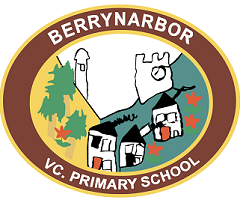
NEWS FROM THE PRIMARY SCHOOL
Happy New Year to all of our friends and neighbours in the village from everyone at the school.
We have had a busy and highly successful few months. In November, our Tudor topic really came to life with a Class 2 and 3 trip to Montecute House, a Sixth Form Tutor morning and a Tudor day in Class 2.
Our Governors Annual Meeting for Parents was a huge success. 26 parents attended and children demonstrated crafts, science and IT activities. The choir also sang for us.
In December, our Christmas Bazaar was smoothly organized by our Friends of Berrynarbor School Committee - a wonderful team who work voluntarily for the good of the school. Thank you for your support. £431 was raised, each class sang and we all had a great time. On the 8th December, the whole school made a Christingle each and with Reverend Wyer's support, we managed to create a golden moment with lighted candles and silent reflection.
Our Carol Service in the church was very jolly, full of lovely voices, young and old. Class 1 created a confident and entertaining version of the Nativity for children and parents.
Lastly, we have had many kind letters of thanks from our senior citizens who enjoyed a spectacular Christmas Dinner serviced by our oldest pupils. Thank you to staff and pupils and the good turn out.
This is what the children said:
"This special Christmas Dinner was fun for everyone who went! The people who came were very happy to be there, including all the children! With the Class 3 room all decked out, and looking beautiful, the children acted as waiters and waitresses serving everyone there. All who came had a brilliant time, with Samuel, Harvey, William and some girls welcoming everyone in. When our guests were in, we served up starters of melon. A main course of Christmas dinner and Christmas pudding or trifle followed by tea or coffee. There were cracker toys and paper hats everywhere! Smiles and laughter, everyone was happy!! When the last person had finished, we cleared the tables of plates and gave out sweets. At the very end of it all, when we had finished singing Christmas Carols, we gave out Christmas cakes for our guests to take home. Our class had made them, marzipanned and iced them and had even made the decorations".
"Then suddenly it was all over. Everybody who was there as our guests were now gone. Only teachers left, well, and us"!
- "We would like to especially thank Ms Simpson who lent us the beautiful tablecloths and all the crockery. Also Mrs. Sussex and Mrs. Luckham who did piles of washing up, and of course our teachers".
Mrs. Karen Crutchfield - Headteacher
Berrynarbor Dinner for Older Residents
Year 6 at my school did a roast dinner for the older residents in Berrynarbor. We chopped vegetables, made cakes, drinks and laid the tables. Our teacher Mrs. Lucas organized it all and made it possible so we would like to thank her again. It looked exquisite.
A friend and I waited at the gate to greet and direct our guests. They said it looked like a proper restaurant because we were all dressed up in black and white and we had decorated the tables and the room. The diners then enjoyed a three course meal with silver service, we didn't drop much food! We provided entertainment by singing songs.
Thank you all for your kind donations and for coming, we hope you enjoyed your Christmas cake. We hope to see you all again next year.
Emma
21
Friends of Berrynarbor Primary School
QUIZ NIGHT
Teams up to 6 people at the Manor Hall on
SATURDAY, 7TH FEBRUARY 2004, 7.30 p.m.
[proceeds to help buy new lap tops]
All Welcome £3.50 per
person
[to include light
supper but bring a bottle!]
Tickets from the Post
Office or Debbie at the School
22
WATER! WHAT DIRTY WATER?
The water works which we have been enduring for weeks have proved a blessing at Pink Heather.
Ahead of the daily water works, we have filled tanks outside with tap water, which although it has avoided having brown water, seems to have been terribly chlorinated - perhaps an extra precaution from South West Water.
Last year we discovered our own spring water supply, which we had tested and which was declared perfectly pure for drinking. However, until now we had only used this for the garden. Now, with an added incentive, we are filling bottles and starting to use our own supply.
The tea brewed as a result has been a revelation and although it's against my religion, I find myself drinking pints of the stuff, even when home-made cider and beer are to hand!
I know many of you have enjoyed your own water supply for years and don't need reminding of the benefits of water with now't in it. As an ex-townie, this has been a discovery which will change our habits long after the water board have left us in peace.
Sterridge Valley Spring Water could one day rival the supremacy of Dell Boy's Peckham Water, without the added radiation!
Bernard
23
BALFOUR BEATTY UTILITIES working with SOUTH WEST WATER
Berrynarbor is one of the major water mains rehabilitation projects in North Devon, where the majority of existing cast iron mains in the area will be scraped and re-lined, or in some areas, even replaced.
By the time you read this, we hope to have provided customers with a public information caravan located in the Car Park from the 16th January. It will be open from Monday to Friday, 9.00 to 11.00 a.m. until March.
We should like to thank everyone in Berrynarbor for their continued patience and understanding during the rehabilitation works in the area.
The following is the programme of works and road closures throughout February and March:
Weekly Programme:
- 1st February - Lychgate to Castle Hill
- 8th February - Lychgate to Well Lodge
- 15th February to 21st February - Well Lodge/Hammonds Farm/Croft Lea
Road Closures:
- 1st - 7th February - Little Gables to Brookmead [Castle Hill]
- 1st - 28th February* - St. Peter's Church to Well Lodge
- 21st February - 28th March* - Little Gables to Beech Hill
Access [where possible] will be given to residents and emergency services only. * Pipe-bursting/open cut works [start dates to be confirmed]
Brian Rushbrooke
[Balfour Beatty Customer Liaison Officer]
24

BERRYNARBOR WINE CIRCLE
The December meeting of the Wine Circle was a resounding success with Alan Rowlands entertaining all those present with his choice of 'bubbly' and wines for Christmas. The January meeting saw members bringing along their favourite wine and then giving the reasons for their choice.
I give below the programme for the remaining four months of this 'season' and wish one and all 'A Healthy and Prosperous New Year'.
- 18th February: Laithwaites Wine Presentation - Barney Dunstan and Friends [£6.00]
- 17th March: Three Members - Six Wines - Members [£4.50]
- 21st April: Quay West Wines Presentation - Andy Cloutman [£5.00]
- 19th May: John Hood - End of Season Spectacular! [£5.50]
Meetings of the Wine Circle are held on the third Wednesday each month at the Manor Hall, and commence at 8.00 p.m.
Further information can be obtained from Alex Parke Chairman [883758], Tony Summers Secretary [883600], Jill McCrae - Treasurer [882121] and Tom Bartlett - Publicity [883408]
Tom
25
CROSSWORD SOLUTION

26

RURAL REFLECTIONS - 16
If the course of one year could be adapted into a play about the countryside, then each season would be a new act, each month a new scene.
In my last article I reminisced about personal experiences that related to each month of the year. It was something I enjoyed doing, yet I concluded the piece by writing about the dangers of living in the past. But why? This question floated around my mind for sometime. Then a recent walk answered it.
My journey began at Willingcott, just southwest of Mortehoe, on a path that followed a route on the old railway line to llfracombe. To begin with there was little indication that I was walking where a rail service had once thrived. This lack of evidence initially saddened me and walking over a token bridge, one that allowed a campsites' roadway to pass underneath, did little to raise my spirits.
They lifted, however, as I reached the summit of my walk. For there before me stood the old Mortehoe station. Now a pleasant tourist attraction for the young, little about the building has changed since the line was closed. Carriages, track, platform canopies and much more remain, the sight of all this allowing my mind to journey back to a time when it was once a busy working station.
This was a time when excited holidaymakers would alight for Woolacombe - and when more pensive holidaymakers would alight, unsure of where they were with the station shrouded in sea mist. It was also a time when impatient llfracombe holidaymakers, overkeen to set off on the last leg of their journey, had to wait whilst the second locomotive that was needed to pull the train up from Braunton, had to be uncoupled, and then wait a bit longer whilst the main locomotive was replenished with water, dry from the effort of getting its passengers to the 600 foot summit.
The sight of this entire nostalgic memorabilia was in vivid contrast to the next sight I viewed, walking on a little further. For where earth had once been painstakingly dug out to create the deepest cutting along the line, earth had now once again been replaced. Only a road bridge with nothing to cross over gave a hint of what was once there before.
Cuttings, however would become a regular feature for the remainder of the walk beyond Lee Bridge. But oh, how excited the holidaymakers must have become just before the bridge as they looked down upon the thick pine woods around Lee Bay and their first glimpse of the sea! Yet it would be the last time they saw it until almost reaching Ilfracombe station. Beyond Lee Bridge evidence of the old railway line once again became scarce. The odd fragments of rusty metal or broken concrete blocks, hidden amongst wild grasses, gave faint clues. The further I walked, so the less I felt in touch with the origins of the route that I was taking. Of course, evidence of earth dug out by men and their picks was all around me. Yet treading within these deep hollows my walk began to take on a new perspective. I could hear very little, barring the occasional solitary bird song, the periodic rustle of leaves and the regular sound of water as it trickled down from the fields above.

With little else to look at, I found myself studying the flora of the banks either side of me. Immediately I was struck by the contrast on both sides. The right hand bank, seemingly starved of warming sunlight, was awash with moss, bracken and ferns. Here and there, young oak trees provided a change of scenery. The left hand bank, however, was getting the full benefit of a low winter sun, allowing shrubbery to grow with gorse bushes most prolific.
Further on, the sounds of the invisible trickling water intensified and I started to hear what seemed more akin to gushing sounds. With each step I listened more intently. Then, as a small recess within the bank came into view, I caught sight of a most narrow yet forceful waterfall. Then I noticed another just beyond it; and then another further on. A delicate smile etched itself across my face. For here, along an old railway line with only me for its audience, nature was performing a unique water show.
Leaving the cascading scenes behind me, I soon realised that the water from the falls was intent on staying with me, as along either side of the path gullies appeared. They allowed the water to flow, sometimes at a flurry, other times at a trickle. Its sight and sound became good company in an otherwise still and silent landscape.
When I did return my attention to the scenery around me, I was momentarily taken aback; for the summits of both cuttings had risen to a substantial height. So sheer was the drop on one bank that excavators had needed to build a small wall to keep the earth at bay. These summits then lowered slightly to allow a farm track to cross the line, courtesy of a stone bridge.
Though obviously man-made, the bridge was now playing a special role in its rural surroundings, for walking out from underneath it I noticed some significant changes to the scenery. Most obvious were the juvenile trees that now lined the pathway. Less apparent was the ever-flowing water, which on one side had gradually developed into a gentle stream. Most inconspicuous of all were the summits of the banks either side of me. Still rising steadily they were at the same time pulling away; and as I carried on something else struck me. The path was now rarely straight. More precisely, it would first veer one way, then the other. It was as though the route of the old railway line was now being determined by the course of the stream. Mother nature, it seemed, had played her part after all.
Content with this idea, I almost missed the next man-made aspect of my walk: a disused concrete hut, perhaps once utilised to house fog men who would warn trains from llfracombe that Mortehoe station was shrouded in Atlantic mists. Despite now being a blot on the landscape, the hut like the bridge before it, acted as a stage curtain to show a different rural scene beyond it. For now I began walking within a most enchanting wood. Sadly, my closest companion along the walk so far, the lovely stream, had darted behind the hut and was pulling away from me. Its sounds, however, were replaced by wonderful birdsong high in the trees.
Then stopping on an old iron bridge that allowed another stream to flow underneath, I stood in awe: for where the bank descended sharply to meet the tributary, low winter sun was allowed to send shafts of stunning rays through the wood; here and there some of the rays flickered on the water where it babbled over rocks. The scene caused another smile to cross my face - here was yet another show stopper, written, produced and directed by nature!
Beyond the bridge the path meandered beneath an extended archway not made by man, but by nature's own trees whose branches crisscrossed above. For a short time a small bank rose up in my left side, impeding my view of the ever-developing river below. However, when the bank descended once again, I found that the flowing waters had disappeared, having dispersed into the narrow beginnings of the Upper Slade Reservoir. The further I walked the wider the reservoir became pushing the hills on the other side away from me. In contrast, the bank to my right stayed close to the pathway. Before long I realised the path was itself now cut into the hillside. Now immersed in a wide valley, I pondered on how photogenic a location this must have been from the other side of the reservoir as steam engines worked the line.
Passing a tranquil waterfall, guiding its clear fluid into the Lower Slade Reservoir, I came upon an old signal post. Like a child who joins a new school halfway through the year, the post looked alone and unable to relate to the greenery around it.
The opposite could be said of the next man-made object I came across just around the next bend. If the signal post were a school scapegoat, then this was the school bully. In the minority it might be, but amongst its natural surroundings it had taken nature on and won, literally ripping mother earth out in the process. I am, of course, referring to the two Slade tunnels. These days only one can be walked through, its partner's entrance now blocked up. But for me, these two tunnels represented much more, for standing in front of them I realised I had two choices. Either I could walk through the open tunnel and enjoy the experience in the process. What lay beyond, I would only discover once I came out the other side. Alternatively, I could build myself a mental wall that would force me to turn around and relive my journey over and over again.
The old railway line is much the same. One can either regard it as a reminder of a past golden age, using its man-made remnants as an opportunity to live in the past. Or one can see the line for what it now is: a place to enjoy the natural backdrop, developed over time since the line closed.
The choice, of course, is yours.
Illustrated by: Peter Rothwell
Steve McCarthy
27
GET WELL WISHES
To those of you who have suffered from the flu bug over Christmas, been in hospital or are still there, our best wishes for a speedy recovery. We are delighted to have Edith back with us again. She would like to say:
"Thank you all for your good wishes and thank you to everyone who visited me in hospital-your support has really helped me to stay positive. It is great to be back home again and it was lovely to spend the festive season with all my family, Edith
28
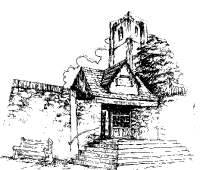
LETTER FROM THE RECTOR
The Rectory
Combe Martin
Dear Friends,
I am just recovering from seeing the final film of 'The Lord of the Rings', which I think will remain a 'classic' for many generations. There is one part of the film which sticks out in my memory because not only is it a great scene, but I do not remember reading it in the original story [which was many years ago, and of course I might have forgotten it, but I think not.] In this battle scene, a good king is being defended by his courageous daughter and is just about to be killed off by the faceless, ghostly, black evil king, who boasts that he cannot be killed by man. At which point, the daughter draws her sword and says: "I am no man! I am a woman!", and proceeds to drive the sword into the place where the face of the evil king should be. Apparently she receives a shock, which throws her backwards, while the evil king shrivels up into nothing and disappears. [Rather like the wicked witch of the west in the 'Wizard of Oz'.]
But it is interesting that in the film, the sources of 'evil' have no face, and only want to destroy and reduce things to nothing. Even the ultimate source of evil has no face, but only an eye, and returns to 'nothing'.
Yet, at the end of the film [and you will need a handkerchief], some of the main characters leave the world which we know, and sail off, not into a sunset but to a brilliant radiant light which is warm and inviting. [Bilbo Baggins says, as he leaves his friends, "l am ready for a new adventure. "]
The whole epic seems to reflect the conflict between good and evil, life and death, being and non-being. The Christian tradition maintains that God created out of nothing, and that He calls us in the journey of life to Himself. This journey we call a pilgrimage and we are all involved in it.
Where death seems to drag us into 'nothingness', the resurrection of Jesus tells us that there is a new adventure ahead. When winter drags us down, spring offers us the new hope of life and summer to come. Always in the difficulties we face, the Christian message offers us the hope and love we need to complete our pilgrimage.
With all good wishes,
Your Friend and Rector,
Keith Wyer
[By the way, I hope you enjoyed the film as much as I did.]
29
THE MIRACLE
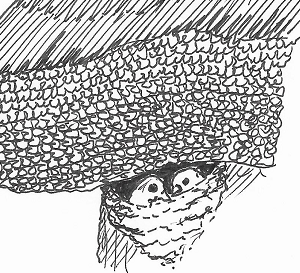
Albeit Winter still is in the air
And the Earth troubled, and the branches bare,
Yet down the fields today I saw her pass -
The Spring - her feet went shining through the grass,
She touched the ragged hedgerows - I have seen
Her fingerprints, most delicately green;
And she has whispered to the crocus leaves,
And to the garrulous sparrows in the eaves.
Swiftly she passed and shyly, and her fair
Young face was hidden in her cloudy hair.
She would not stay, her season is not yet
But she has reawakened, and has set
The sap of all the world astir, and rent
Once more the shadows of our discontent.
Triumphant news - a miracle I sing -
The everlasting miracle of Spring.
John Drinkwater
[1882-1937]
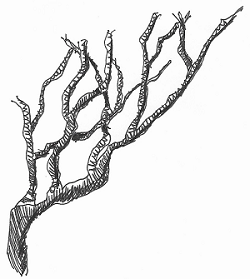
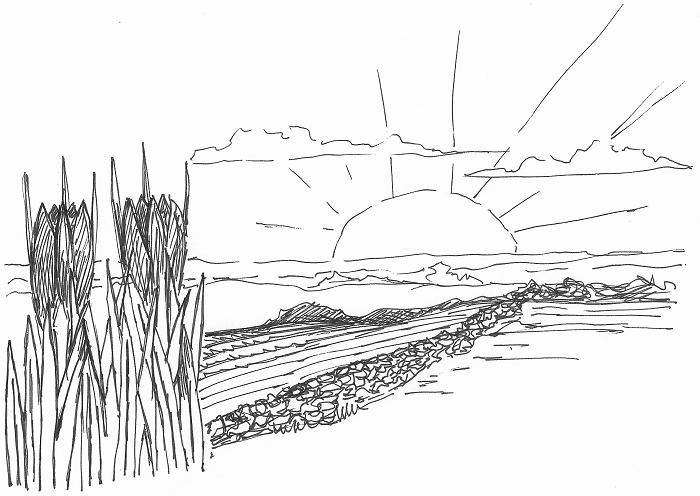
Illustrations by: Paul Swailes
30
THE BEST PLACE IN THE WORLD
Now 68 years old and being retired, I have time to reflect on my life and its memories. It has been an interesting life, with highs and lows like all of us have experienced. Where the interest might lie is in the events I lived through, particularly in my childhood.
In 1935 when I was born, the threat of World War was imminent, eventually happening in 1939. As a child there are many memories of starting life near the docks in the East End of London and interruption of my first week of school by an air raid, frightening to an adult, let alone a child. After a short duration of this type of experience, we came down to a different world, called North Devon.
At first we lived in a caravan with two families, my father's brothers' families. Then moving to a house to accommodate us all. After a while, my mother rented a semi-detached cottage for herself and me, with oil lamps and what was called a Bodley for heating the rooms and cooking by. These quaint living conditions, to say the least, that we were putting up with, was a credit to my mother, who was willing to struggle and make a home for us. Let's face it, it was far better than the bombing we had experienced in London! In fact, I lived in that cottage, improving the facilities as time went on, until 1971. This new world we had escaped to was a pretty little village called Berrynarbor. Later I came to llfracombe to live, and that has been my home ever since.
The first experience of war, after moving down to North Devon, was the slow droning sound of enemy aircraft going over at night to bomb the iron foundries of Wales, producing steel for the war effort. As time went by, that became less but was replaced by the influx of British and American troops. They were preparing for the assault on captured France, the code name for which was Operation D-Day. The main activity was testing the oil line which would be needed for this campaign. The test took place from our coastline, Watermouth beach in fact, over to Wales. The code name for which was PLUTO, of which you have heard in previous newsletters.
The American soldiers gave us children chewing gum and taught us greetings like 'Howdy Partner' - the cockney version, 'Watcha mate' or in Devonian, 'How be knocking vore'. What an upbringing for young children - I suppose it was like learning three languages, if dialect could count - perhaps not!
The end of the war came and what seemed, to a young child, a long line of parties to celebrate the victory. These celebrations took place in the streets and village halls, and being a young lad, I would stuff myself to the point of being sick!
Living in the country after the war, we did not feel the food shortage as others did. There was rationing, of course, but the slogan 'Dig for Britain' was very evident in Berrynarbor. At times, the individual gardens were pictures - pigs with chickens and fresh vegetables!
One day, when the food chain improved, my mother handed me a strange looking object. It was half moon in shape and yellow in colour. She called it a 'banana', something to eat! Well, food being my favourite pastime, I didn't need encouragement and tucked straight in, but she stopped me. "Peel it first," she said. That first bite was beautiful and I was hooked! Since that day, bananas are one of my favourite foods and I have one every day. So, if you see me scratching myself under the arm, like a monkey, you'll know why!
After the war my relatives returned to London, but my mother and I stayed in Berrynarbor. A cockney lad being brought up in the country. Regrets? No! North Devon is my home now, I received my passport after ten years to call myself a local!
The Devonian people have a laid back way of living which influenced me to do likewise. The pace of life in the country is a lot slower than in the towns and cities. When I visited these places after the war and sampled city life, I thought everybody had gone mad! It was a relief to get back to the life I had been used to - it suited my inner feelings.
I think about my life in North Devon, growing up in Berrynarbor and then Ilfracombe and the sad experience of war for many, was the turning point of my life for the better. When visitors say what a beautiful place we live in here and then have to go back home to face a built-up area and pollution, it makes me realise that I can enjoy this place all the year round! I imagine many city dwellers would give their eye teeth to live in a place like this -to me the best place in the world!
John Vallance
31
BERRY BROADCASTING COMPANY
On the west side of Berrynarbor, the Vets, led by Biff, are considering a rumble with their green-wellied rival gang, the Tarqs, led by Tarquin Cholmondley-Warner. It is decided they will challenge the Tarqs during a village dance at the Manor Hall - which is neutral territory.
Tensions run high in the normally peaceful village, between the traditionalist, cider drinking Vets and the flowerpot loving, Pimms drinking Berry in Bloomers, the Tarqs. The Post Office is up for sale and Alan and Nora have gone away on holiday, leaving their estate agents to sell it to the Greek tycoon, Dennis Roussos, as a wine bar. The Vets are outraged as they want the shop to be turned over to them and used as a fish and chip shop. Officer Kranky is run off his feet and Headquarters have sent him a deputy to help maintain order.
Maria and Tony, from opposing sides in the dispute, meet and fall in love. Will the dreaded rumble take place? Will there be tragedy and death in the village? Will blood be spilt at the village dance? Will Alan and Nora return from the Costa del sol to find battered mars bars and wallies, instead of shiraz and mouton Rothschild? Will the village win Berry in Bloom if the flowerpot men are sabotaged?
Ladies and gentlemen, boys and girls, hold on to your seats for:
SOUTH WEST-SIDE STORY!
FRIDAY & SATURDAY, 12th & 13th MARCH 2004 MANOR HALL, 7.30 p.m.
Tickets: £5.00 each will be available from the Post Office and
The Globe from mid-February.
Theatre Bar Ice Cream Fish and Chip Supper Raffle
Not to be missed - the Show that has taken the West End by storm!
32
LOCAL WALKS - 82
"Down by the Riverside"

At first glance there did not seem to be a lot happening on the river. But there, not far from the Civic Centre, a little grebe surfaced not for long though. It soon dived. We counted up to thirty slowly and it reappeared some distance away. It is a proficient underwater swimmer and can stay submerged for up to half a minute. Perhaps its alternative name, dabchick, best suits this blunt-tailed little bird, grey-brown in its winter plumage.
A little further on a pair of red-breasted mergansers were also showing off their diving skills. These graceful ducks, with their long slender red bills, are a variety of 'sawbill'.
It was the beginning of a new year and although it was a dull and chilly day, plenty of people were out on the path strolling or cycling, some trying out new bikes or binoculars.
A flotilla of widgeon passed by; at the water's edge a mixed group of ringed plovers and dunlin. The dunlin are the commonest of the small waders to be found on the shore. They are noted for their aerobatics, forming dense flocks, twisting and turning together with great precision. It is a fine spectacle witnessing the billowing shapes created by these birds, now silver white, then dark grey against a winter sky.
On a little beach, just beyond Pottington, stood about thirty black-tailed godwits. They are tall waders with a very long straight bill, grey-brown above with a white rump and wing stripe and a broad black tail band. Suddenly they all took off, flying low over the path, heading for the meadow which is crossed by the Bradiford Water. This elegant visitor has a rather mellifluous Latin name - Limosa limosa.
A few brave flowers lingered, sow thistle, dandelions, groundsel - all members of the compositae family. Then the heady fragrance of winter heliotrope [an ugly pinkish flower with heart-shaped leaves] followed by something more pungent. At Higher Strand a dead seal lay on the bank; headless and looking like a large sandbag.

After that discovery, we were cheered by a mixed flock of thrushes in a paddock and adjacent field, which included redwings and fieldfares. It is always heartening to see these winter visitors which have travelled so far to reach here and they are very handsome birds too, often roaming the countryside together.
The redwing has a cream coloured stripe above the eye; red on the flanks and under the wings and the markings on the breast are short streaks rather than spots.
The fieldfare has a slate grey head and light grey rump [giving it the old country nickname of 'pigeon felt'], chestnut brown back and darker tail and wings. The buff coloured breast has heavy black spots. Some of these are chevron shaped. The shading on the face gives the fieldfare an angry expression. Some were perched on a hedge seeking haws and other berries. When their normal sources of food are scarce, they may be found attacking apple fallings.
Of the two resident thrushes and the two winter visitors, the redwing is the smallest thrush, followed by the song thrush, then the fieldfare and the largest is the mistle thrush.
The Taw was wider now and its surface was still and glassy, mirroring the cloud formations. Soon the sun was sinking. There was a reddish tint to the sky a glow on the horizon, reflected in the waters of the river.
Illustrated by: Paul Swailes
Sue H
33
HOW TO LIVE LONGER
It is a relief to know the truth after all those conflicting medical studies:
- The Japanese eat very little fat and suffer fewer heart attacks than the British or Americans
- The French eat a lot of fat and also suffer fewer heart attacks than the British or Americans
- The Japanese drink very little red wine and suffer fewer heart attacks than the British or Americans
- The Italians drink excessive amounts of red wine and also suffer fewer heart attacks than the British or Americans
- The Germans drink a lot of beer and eat lots of sausages and fats and suffer fewer heart attacks than the British or Americans
Conclusion - Eat and drink what you like. Speaking English is what kills you!
34
UNFIT? OVERWEIGHT?
Following the Christmas festivities and over indulgence of all those goodies [food and wine], that go with it, are you feeling unfit, lazy and overweight?
Yes! Then why not do something about it and join the ALL ROUND BODY WORKOUT held each Wednesday, 11.30 a.m. to 12.30 p.m. at the Manor Hall.
This is a fun, effective and safe workout [not aerobics or too energetic] with Valerie - an experienced and qualified [and sympathetic] instructor. You learn how to work your body correctly and the class tones and conditions all parts of the body [half you had forgotten exist!], improves cardio-vascular and respiratory function, increasing flexibility and control. But above all, it does you a power of good mentally and physically whilst enjoying yourself!
Why not come and join the group?
35
PANCAKE DAY
Pancake Day, or Shrove Tuesday, is the traditional feast before Lent - the 40 days before Easter, traditionally a time of fasting. On Shrove Tuesday, Christians went to confession and were absolved of their sins, or 'shriven'.
Pancakes were the perfect way to use up the eggs and fat before beginning the Lenten fast. Eggs were symbols of creation, flower for the staff of life, salt for wholesomeness and milk for purity.
A thin, flat cake, made of batter and baked on a griddle or fried in a pan, the pancake is featured in cookery books dating back to 1439. The tradition of tossing them is almost as old, and certainly goes back to the early 1600's.
Shrove Tuesday was a day of revelry and at the ringing of the pancake bell, villagers stopped work to go home to make pancakes and join the games and merrymaking.
Olney in Buckinghamshire is well-known for its pancake race and at Westminster School they hold the Pancake Greaze or Scrimmage, when the cook tosses the pancake over a bar separating the upper and lower schools, and the boy who gets the biggest piece is rewarded with a guinea!
36

THE GREAT NORTH DEVON KNIT IN
This is a sponsored event for the North Devon Hospice taking part all over North Devon in halls, homes, pubs and even shop windows.
It is easy to join in. Anyone can get sponsored to knit strips of wool for a maximum of two hours. The strips are then sent to the Hospice where they are sewn into blankets to be distributed both locally and abroad, wherever there is a need.
Berry will be 'Knitting In' on Tuesday, 24th February, from 10.00 a.m. to 12.00 noon, at the Manor Hall in conjunction with the Sunday School Pancake and Coffee Morning - it being Shrove Tuesday. The North Devon Spinners have kindly agreed to share the Hall for the morning, so they will be working away too! A veritable hive of community activity!
Knitters are required to use size 8 [4mm] needles and double knitting wool, working in garter stitch on 20 stitches to the row. Everyone is welcome to join in and sponsor forms are available either from Chicane [883544] or the Post Office. If anyone has any unused and unwanted double knitting wool they could donate, that would be appreciated.
If you are neither a knitter nor a spinner, then do please come along for a cup of coffee and a scrumptious pancake - join in the fun and support the event.
37

38
CAN YOU HELP?
Victoria Jackson of Melbourne, Australia, who is researching into her family history, has sent an e-mail via the Newsletter website enquiring if we can help her.
Victoria's great-great-aunt and her husband lived here at Queensmead some forty years ago, in the early 1960's. Queensmead, then on Newberry Road, is now on Newberry Close. Her aunt and uncle were called Margaret and Percy Milton. Sadly, Percy died around 1962. It is not known how long the couple, who had no family, lived here or when Margaret left or to where she moved. With no children, it has been difficult for Victoria to trace this line of the family.
If there is anyone who, by any chance, remembers Margaret and Percy, or can help with any information at all, please do give me a ring [883544] it would be lovely to help Victoria in her quest.
Judie - Editor
39
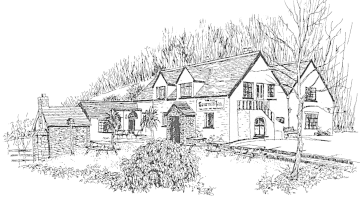
YE OLDE GLOBE and THE SAWMILL INN
We hope you all had a joyful Christmas and wish everyone a happy and prosperous 2004.
What's On in February and March:
The Globe
- 'Curry Night' every Wednesday night a selection of curries will be available priced at just £4.95 each
- '2 for 1' meals, every night plus Saturday lunchtimes.
The Sawmill
- Saturday 21st February - our popular 'All you can eat Curry Night' is back for only £8.00 This will probably be the last 'All you can eat' night until the autumn - so book early
- Sunday Lunchtime Carvery Special Offers are available until the end of
- February: Discount advance bookings, free sweet or free kids carvery - check details when booking
Both Pubs - Book early for these important dates:
- Saturday 14th February is St. Valentine's [come around quickly, hasn't it gents!]
- Sunday 21st March is Mothering Sunday - book early for this one to treat mum and grandma
National Pubs Week: Saturday 21st February to Saturday 29th February
- The Sawmill - free pool table Tuesday 24th and Friday 27th
- The Globe free pool table Monday 23rd and Wednesday 25th and look out for other promotions in the pub.
Diary Dates:
- Sunday 1st February - Quiz Night at The Globe, 8.30 p.m.
- Saturday 14th February - St. Valentine's Night [book early]
- Sunday 15th February - Quiz Night at The Globe, 8.30 p.m.
- Saturday 21st February - Curry Night 'All You Can Eat', Sawmill
- Sunday 29th February - Quiz Night at The Globe, 8.30 p.m.
- Sunday 14th March - Quiz Night at The Globe, 8.30 p.m.
- Sunday 21st March - Mothering Sunday [book early]
- Sunday 28th March - Quiz Night at The Globe, 8.30 p.m.
Weight Watchers
Would anybody be interested in having Weight Watchers' meetings at The Globe. Julie can do it on either Mondays or Thursdays at 9.00 a.m. We need at least 10 people for it to be worth her while to run the group. If you are interested, please contact Karen on 882259.
40
AT-A-GLANCE DIARY
| FEBRUARY | |
| 3rd | W.I. Meeting, Manor Hall, 2.30 p.m. Alison Berridge: The Children's Hospice South West |
| 7th | Quiz Night [Friends of Primary School] Manor Hall, 7.30 p.m. |
| 10th | Parish Council Meeting Manor Hall 7.30 p.m. |
| 11th | Mobile Library in Village from 11.30 a.m. Bikers of Berrynarbor: Cook Island. 7.30 p.m. |
| 14th | St. Valentine's Day |
| 15th | Bikers of Berrynarbor: Ride to Classic Bike Show, Shepton Mallet see poster for details |
| 16th | Primary School & College: Half Term to Friday 20th February inc. |
| 18th | Wine Circle, 7.30 p.m., Manor Hall: Barney Dunstan and Friends Laithwaites - £6.00 |
| 24th | Shrove Tuesday: Pancake and Coffee Morning and Great North Devon Knit In, Manor Hall, 10.00 a.m. to 12.00 noon |
| 25th | Mobile Library in Village from 11.30 a.m. Friendship Lunch, The Globe, 1.00 p.m. |
| MARCH | |
| 2nd | W.I. Meeting, Manor Hall, 2.30 p.m. Nina Parnell - Senior Adviser for Care Direct |
| 9th | Parish Council Meeting, Manor Hall, 7.30 p.m. |
| 10th | Mobile Library in Village from 11.30 a.m. Bikers of Berrynarbor: Pint and Chat, Sawmill Inn |
| 17th | St. Patrick's Day Wine Circle, 7.30 p.m., Manor Hall: Members, Six Wines - £4.50 |
| 21st | Mothering Sunday St. Peter's Church: Service with Sunday School |
| 24th | Mobile Library in Village from 11.30 a.m. |
| 28th | British Summer Time Begins 3.00 a.m. |
| 31st | Friendship Lunch at The Globe. 1.00 p.m. |
| APRIL | |
| 2nd | Primary School & College: End of Spring Term |
| 6th | W.I. Meeting |
| 7th | Mobile Library in Village from 11.30 a.m. |
| 9th | Good Friday |
Manor Hall Diary:
| Mondays | Badminton, 7.30 p.m. |
|---|---|
| Tuesdays | 2nd & 4th in month: N.D.Spinners Yoga, 7.00 p.m. |
| Thursdays | Whist Drive, 7.30 p.m. |
| Fridays | Short Mat Bowls, 7.00 p.m. |
| Sundays | Short Mat Bowls, 2.00 p.m. |
Mobile Library:
(Assistant - Jacqui Mackenzie)
| 11.30 - 11.45 a.m. | Sandy Cove |
|---|---|
| 11.50 - 12.05 p.m. | Barton Lane |
| 1.15 - 1.40 p.m. | The Square |
| 1.45 - 2.05 p.m. | Sterridge Valley |
41
MUMSTo the women who tie up loose ends
Mum and dad were watching TV when mum said, "I'm tired and it's getting late. I think I'll go to bed."
She went to the kitchen to make sandwiches for the next day's lunches. Rinsed out the popcorn bowls, took meat out of the freezer for supper the following evening, checked the cereal box levels, filled the sugar container, put spoons and bowls on the table and prepared the coffee pot for brewing the next morning.
She then put some wet clothes in the dryer, put a load of clothes into the washer, ironed a shirt and secured a loose button.
She picked up the game pieces left on the table and put the telephone book back into the drawer.
She watered the plants, emptied the wastebasket and hung up a towel to dry. She yawned and stretched and headed for the bedroom. She stopped by the desk, wrote a note to the teacher, counted out some cash for the field trip, and pulled a text book out from hiding under the chair.
She signed a birthday card for a friend, addressed and stamped the envelope and wrote a quick note for the grocery store. She put both near her purse.
She then washed her face with cleanser, put on her night solution and age fighting moisturiser, brushed and flossed her teeth and filed her nails. "l thought you were going to bed'" called dad.
"I'm on my way," she replied as she put some water into the dog's dish and put the cat outside before making sure the doors were locked.
She looked in on each of the kids and turned out their bedside lights, hung up a shirt, threw some dirty socks into the dirty clothes box and had a brief conversation with the one up still doing homework.
In her own room, she set the alarm, laid out clothing for the next day and straightened up the shoe rack. She added three things to her '6 most important things to do' list, said her prayers and visualised the accomplishment of her goals.
About that time, dad turned off the TV and announced, to no one in particular, "I'm going to bed." And he did, without another thought!
Anything familiar here?
42
TWINNING
Just over 25 years ago, Combe Martin commenced a Twinning with Cormelles-le-Royal, a village on the fringe of Caen in the north or Normandy. During the period since then, we have been delighted to welcome several Berrynarbor families - some of whom played an active part in the 20th Anniversary celebrations.
More recently we have had another major event, when we entertained about 36 French visitors at the joint celebration of our 25th Anniversary and the Queen's Golden Jubilee. That was repeated in 2003 when a group of 30, including representatives from Lee, paid a reciprocal visit to Cormelles that proved so enjoyable that some of our group were tempted to hide as the time for returning approached!
Our current project hopes to entice our friends from Cormelles to celebrate this year's Earl of Rone week-end with us. For this to succeed we need to persuade our friends to visit us for a long week-end and we need to be able to provide a large number of families to host them for the duration of the visit. Because we are proud of our part of Devon, we hope to be able to spread our visitors over an area larger than just our own village.
We are always pleased to welcome new members to our Association from surrounding villages - and particularly from Berrynarbor with whom we have such a close relationship.
I should be very happy to provide more information about the possibilities offered by Twinning. I can be contacted on [01271] 883085 or deshume@zoom.co.uk.
Des Hume - Chairman
43
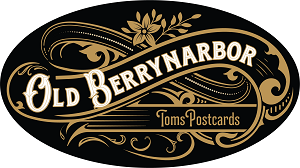
OLD BERRYNARBOR
In Berrynarbor 35 - View No. 87
This fine photographic postcard would have been taken by William Garratt around 1904 and shows the Berrynarbor Blacksmith, Samuel W. Harding, leading a horse probably to his blacksmith shop next to the school building in Silver Street.
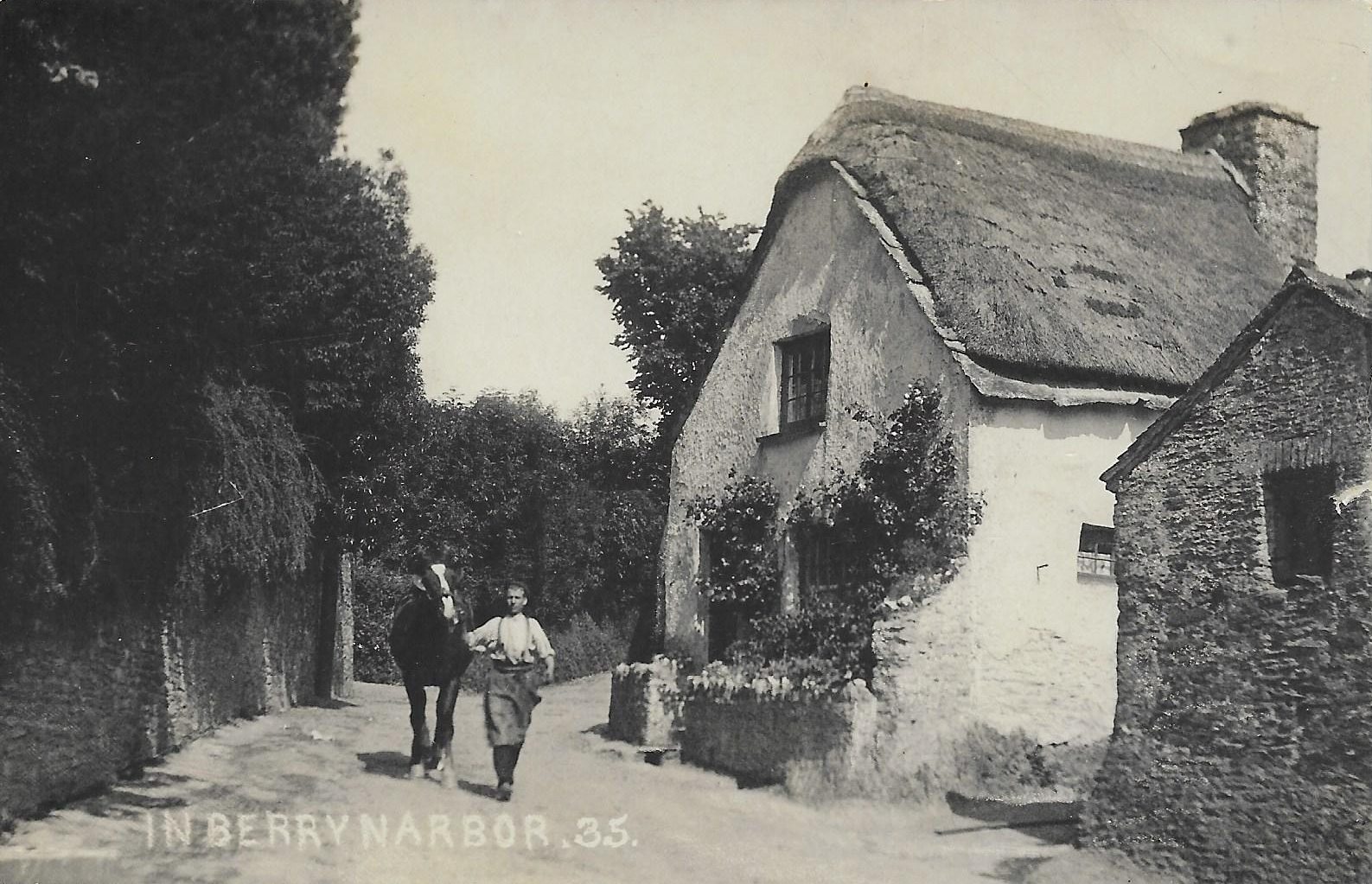
He is seen here walking down from his home just up the road to Castle Hill where he lived with his wife, Ellen and their five children. They had four daughters, Anna, Evline, Ellen and Bessie, and one son, William, the youngest member of the family.
They lived in the cottage that sticks out into the road, numbered 55 and now called 'Hill Crest'. The cottage Sam is just walking by is No. 54, now known as Dunchideock House, where Claude Richards lived and bottled up milk in the outhouse just visible on the right.
The blacksmith's shop and forge was where the garage of 'Little Gables' is now, just beside our village school. Sam always had a fire burning with dusty cheap coal and a very large pair of bellows, between 5 and 6 feet long, to enable him to produce the high temperatures needed as a working Blacksmith.
He would both repair and make all the farming implements for the farmers around. They would bring their horses to him for re-shoeing at one shilling (12d - equivalent to 5 pence) per shoe and would also make 'iron hoops' for the boys of the village, at sixpence [6d] each. In the yard between Dunchideock House and the outhouse was a very large flat circle of iron where Tom Latham, the carpenter, would have his large wooden cart wheels at the ready for Sam to bring up the white hot iron hoop 'tyres' to put on. When these cooled, they would shrink tightly onto the wheels.
Sam's father, Thomas Harding, who married his wife Kezia from Marwood , around 1840, was the blacksmith before him.
Note how Dunchideock House was then thatched, in common with several other properties in the village. Sadly, but thankfully, Capel Cottage remains the only thatched cottage left. In my view it is high time that the Government /County Councils should give at least a 50% Heritage Grant towards the re-thatching of such properties.
In the 1920 Watermouth Estate sale, No. 54 [Dunchideock House] was Lot No. 59, in the occupation of Mrs. M. Toms as Quarterly Tenant, and listed as 'A Thatched Cottage, Piggery, Slated Cart Shed, Slated Coal Stores and Large Garden with a Tithe of Is. 1 d. This Lot gets its Water from a Tap in the road.' It sold for £120.
No. 55 [Hill Crest] was Lot No 60, in the occupation of Mr. G.H. Camp as Quarterly Tenant, listed as 'A Very, Superior Tiled Cottage, with Galvanised Shed, Potato House, Piggery and Garden. There is a Well and Pump on this Lot.' It sold for £75.
Tom Bartlett
Tower Cottage, January 2004
e-mail:tomandinge40@gmail.com.

Illustration by: Paul Swailes
44
Printed by:
Len Goddard [Design & Printing Co.]
Castle Dene
High Street
Combe Martin
EX34 OHS
Tel: [01271] 882820
45
